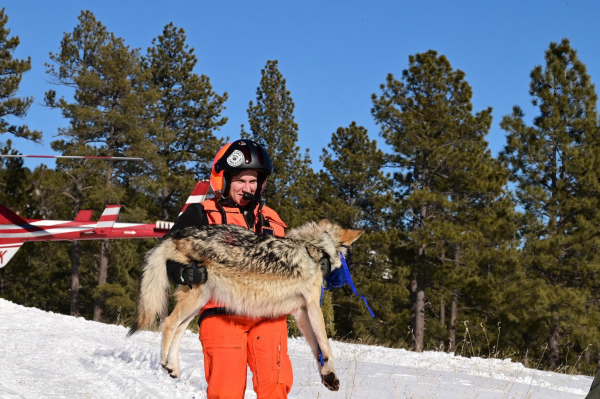Anti-Hunting Group Cries Wolf Over Wolf Management Law
Another Out-of-State Group Tries to Hijack Michigan’s Ballot
LANSING –The president of one of the most radical animal rights organizations in the country popped up in Lansing Tuesday to announce a coalition circulating a petition to put PA 520 of 2012 – also known as the Wolf Management Law – on the 2014 ballot as a referendum.
Wayne Pacelle, President of the Humane Society of the United States (not to be confused with your local animal shelter), said the thought of wolves being trapped or hunted “really appalls” him during a press conference at the Capitol. The coalition calls itself “Keep Michigan Wolves Protected” and seeks to collect 225,000 signatures by the end of March to put the referendum on the 2014 ballot. If it collects enough signatures, Public Act 520 would be placed on the ballot in November of 2014. Pacelle was also quoted in MIRS News as saying, “Our hope is if we can win here in Michigan, we can address the . . . killing of wolves in other states as well.”
“While it’s no surprise that a Washington-based anti-hunter feels ‘appalled’ at the thought of an animal being hunted in Michigan, we make wildlife management decisions based on sound science, not emotion,” said Tony Hansen, Chief Information Officer of Michigan United Conservation Clubs (MUCC). “The Humane Society of the United States is just another out-of-state interest group trying to hijack Michigan’s ballot to push its radical animal rights agenda.”
PA 520 added wolves to the list of game species, which allows the Natural Resources Commission (NRC) to create a limited public hunting season (the law does not itself create a season). The NRC is mandated to use sound science in making wildlife management decisions, and both it and the DNR have committed to following the Wolf Management Plan, which was approved in 2008 and is the basis for the federal government’s decision to turn wolf management authority over to the state.
The Wolf Management Plan authorized the use of public hunting as a management tool when wolf densities are linked to human-wolf conflicts such as livestock or pet depredation. During a presentation to the NRC in earlier this month, the DNR provided data showing a correlation between the increase in wolf densities and livestock depredation in some areas of the U.P., despite the availability of other control measures.
“The animal rights groups claim that there simply isn’t enough data or science available to determine whether wolves can sustain a hunting season,” said Erin McDonough, Executive Director of MUCC. “That’s precisely what the Wolf Management Law provides — it allows the NRC to do its job which is to manage wildlife populations based on the best available science. The NRC has not set any sort of wolf hunting season. It is coordinating efforts within the DNR to provide the very data and science that the anti-hunting groups claim doesn’t exist.”
Founded in 1937, MUCC is the largest statewide conservation organization in the nation





